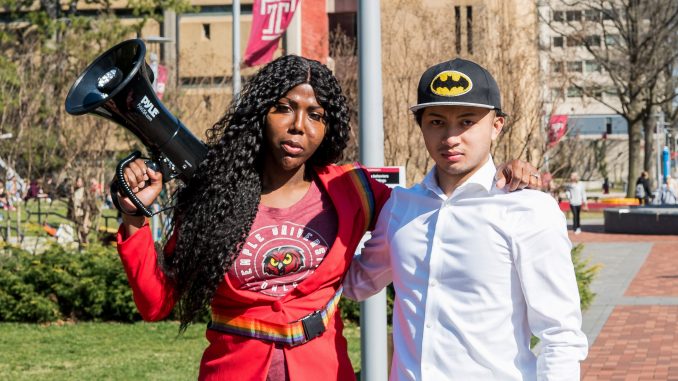
Kendall Stephens always carries around a blowhorn to counter-protest any forms of hate speech on campus. Last semester, a demonstrator using hateful language in a protest on campus pushed Stephens, and, on another occasion, a demonstrator grabbed the blowhorn out of her hand, leaving a cut.
Stephens, a senior public health and social work major and the co-chair of Parliament’s Health and Wellness Subcommittee, introduced the Counterprotest Resolution Bill in October and December 2021 that, if passed, would encourage the relocation of protestors from high traffic, private areas to less busy, public areas on campus. The university and Parliament are still determining the private and public boundaries.
The bill would also establish the Protest Response Team, which would enforce crowd control through de-escalation techniques and provide students who witness protests with resources on counter-protesting, protest avoidance and mental health.
It would apply to all protestors who wish to demonstrate on campus, not just those who use hateful language, Stephens said.
In November 2021, Chris Carey, senior associate dean of students, Parliament Speaker Townley Sorge, Lillian Sclafani, the co-chair of the Student Health and Wellness subcommittee, and Antonio Mendoza, an at-large representative on the subcommittee, discussed public and private boundary lines on campus and how to relocate protests that are on private property, Stephens said.
Temple University Police Department, alongside student groups, the Office of Institutional Diversity, Equity, Advocacy and Leadership office, Temple Student Government and the Dean of Students Office, would also help notify students when protests occur, according to a summary of the bill.
Temple currently uses 25Live, a scheduling tool, where protestors can reserve a space to protest and inform the university if protestors will bring food or if minors will attend, wrote Jason Levy, senior director of the Student Center, in an email to The Temple News. The sign-ups are content-neutral, meaning Temple does not know what each protest will be about.
Any sign-up policies that universities establish for protests would have to be content neutral because it would be more challenging to prove a policy based on content is constitutional, said Erin Coyle, a journalism professor and free expression expert.
“A public college campus can only do so much to restrict the free speech activities including protests of students on that campus, and creating a policy that would restrict those kinds of free speech activities,” said Lindsie Rank, student press counsel at the Foundation for Individual Rights and Education.
To demonstrate on private property, Parliament proposes protestors would need a permit and permission from Temple, Stephens said. She is waiting to hear from a TUPD sergeant who can confirm the viability of the proposal.
Stephens said some students are emotionally affected by witnessing certain protests.
“You’re seeing students breaking down in tears, you’re seeing students becoming very enraged, you’re seeing the fear, you’re seeing the heightened anxiety,” Stephens said.
The Protest Response Team would distribute literature at protests that provide suggestions on disengaging with protestors and how remaining calm can reduce feelings of stress and anger amid a confrontation, according to a summary of the bill.
NuRodney Prad, director of student engagement for IDEAL, has met with Stephens since the Fall 2021 semester and thinks the bill is a great way to show student support for inclusiveness on campus because it has the support of student government.
Many aspects of the Parliament bill align with IDEAL’s initiatives, like suggesting that students disengage with protestors, Prad said.
IDEAL does not actively participate in counter-protesting, like the Parliament bill advocates for, Stephens said.
Willow Knotts, a sophomore advertising major, feels uncomfortable when she sees protesters yelling at students through their megaphones.
“I would definitely support [Parliament] because, I don’t know, it just kind of disrupts the campus-feel,” Knotts said.
Despite the support, Parliament is struggling to pass the bill due to members voting no, when unanimous approval is needed.
Stephens reached out to the Parliament members who voted against the bill to ask if there were any improvements that could be made and to clarify any confusion about the bill, but has not received a response, she said.
“We praise ourselves as being diverse and protecting and respecting our diverse community, which means that it will see our diverse community being attacked because of those differences that are meant to bond us together not create divisions, we have to, as a Temple community, step in and do something,” Stephens said.


Be the first to comment